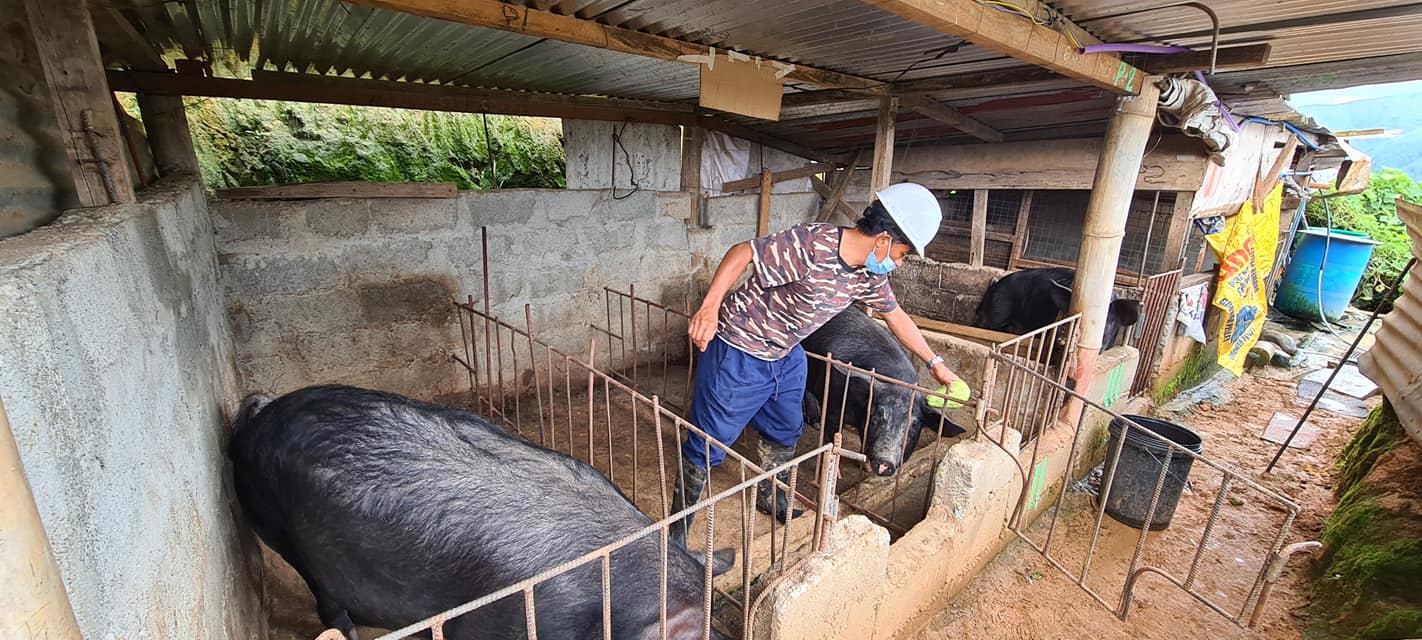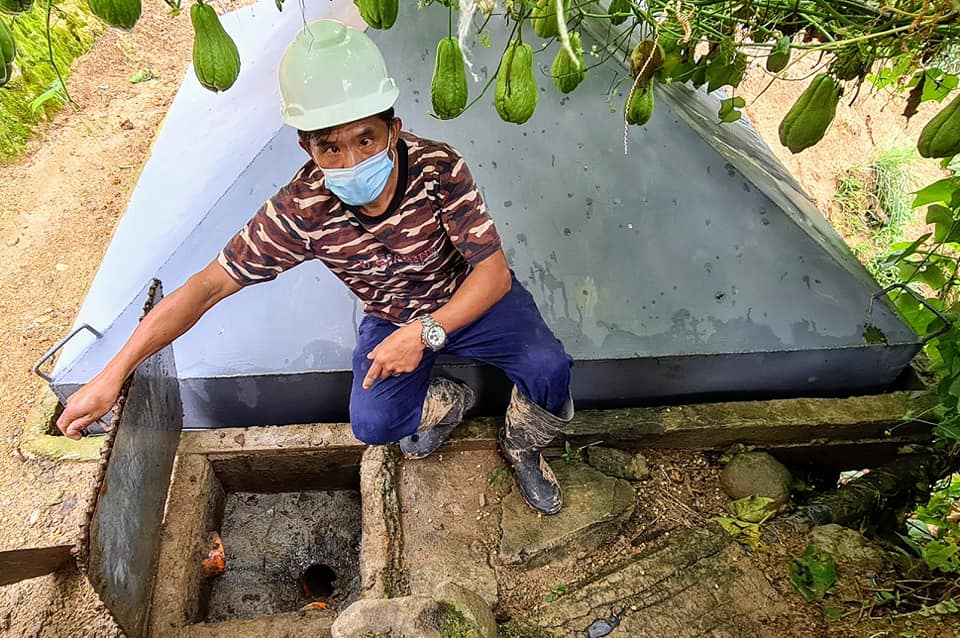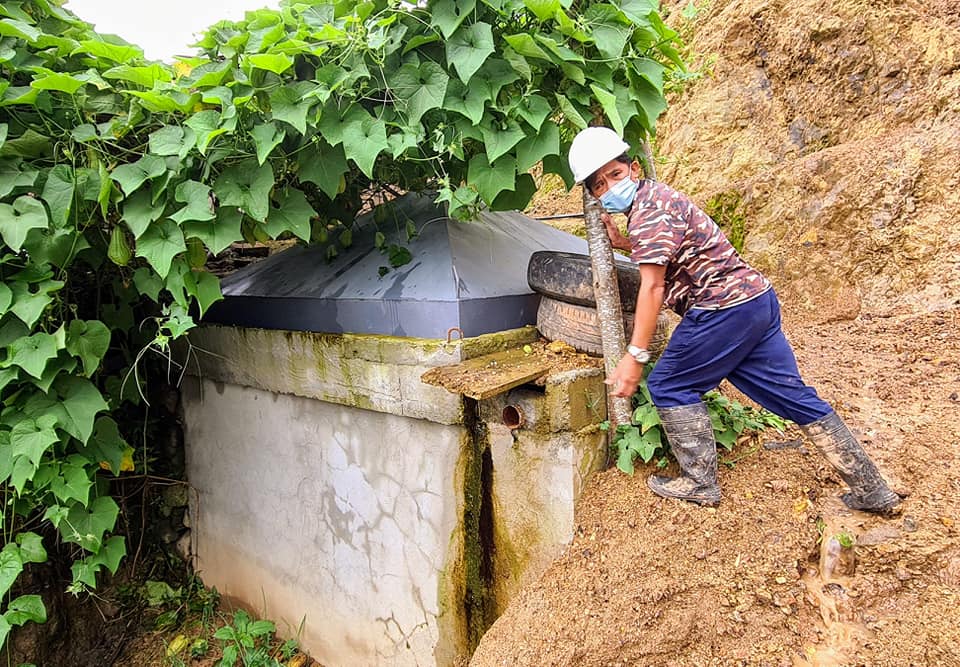MOUNTAIN PROVINCE, August 23, 2021 – Department of Agriculture (DA) – Special Area for Agricultural Development (SAAD) Program’s Swine Production beneficiary Wilma Bodisen from Mountain Province increased her animal stocks from 10 to 37 after two years.
Wilma, 41, is a member of the Napua Farmers Timpuyog Organization (NFTO) in Napua, Sabangan. The group, which has 60 members, was organized and registered under the Department of Labor and Employment (DOLE) in 2019.
Napua is the pioneer village in Sabangan to receive SAAD interventions in 2019. Half of the group engaged in SAAD’s swine production while the other half received vegetable production inputs.
The swine production project, worth Php 3,350,500, is composed of hog feeds (from starter, grower, finisher, breeder, lactation), biologic, tricantera cuttings, plastic pipe elbows, plastic pipes, plastic drums, nipple drinker, and corrugated GI sheets.
A supplementary supply worth Php 56,000 was also given to the organization in September 2019.
Each member received a fair share of the interventions worth Php 56,775.
Wilma Bodisen’s project implementation
Wilma and her husband, Henry, are private company employees and farm laborers. Earning just enough for their daily living and their children’s school needs, they get by with combined earnings of around Php 13,500 a month.
When the SAAD project came, Wilma was given 10 piglets with complete feed support and complimentary supplies.
Balancing work while tending to their own garden, the couple reared original stocks for almost 6 months before gaining sales. However, sales were not regular due to mobility constraints brought about by the African Swine Fever (ASF) and the CoVid-19 pandemic.
Still, she managed to sell 10 fattened pigs at Php 120 per kilogram of live weight earning a total of Php 95,000 on the first cycle, March 2020.
As of August 2021, they are now tending mother pigs for the 5th production cycle. Offsprings are reared as fatteners.
Thirteen (13) swine from the 3rd production cycle were sold in February 2021. Wilma earned a net income of Php 40,005, which was used to buy a refrigerator.
After finding swine production profitable, Wilma and her husband decided to work hand-in-hand to increase their breeders from one to five. Because of this, Henry had to quit work and focus on the swine production business of the family.
As of August 10, Wilma and her family now have three breeders, with 37 offspring, ranging from nursery pigs to three-month-old fatteners. All in all, they are tending to 40 heads.
Sanitation and biosecurity management
Biogas is Henry’s way of complying with the sanitary rules of the barangay and respecting his neighbors.
“Iti panag-adu met iti taraken ket in-consider mi iti sanitation ken kaaruba sakbay kami masita, sunga napanunot ko iti panaka-aramid iti Biogas,” Henry said in an interview.
[With our successful plans of increasing our stocks, we have to consider sanitation and most especially our neighbors; thus, I pushed through constructing the biogas facility.]Also, it is his way of managing his pig manure wastes towards a clean and healthy environment for both his stocks and humans alike.
They adopted a design from Henry’s former workplace where they are using biogas as an alternative source of energy. The design includes a pipe leading manure and water into the tank.
The by-product of the biogas generation process is an organic fertilizer, which could be a perfect supplement to or substitute for chemical ones.
The organic fertilizer is used for the family’s vegetable garden to accelerate plant growth and provide resilience to diseases. ###
Writer: Dinah D. Ay-yango, DA-SAAD CAR Information Officer MP
In photos: Wilma Bidosen’s swine project site, represented by husband Mr. Henry Bodisen
Source: DA-SAAD Mountain Province Facebook Page







Comments (0)